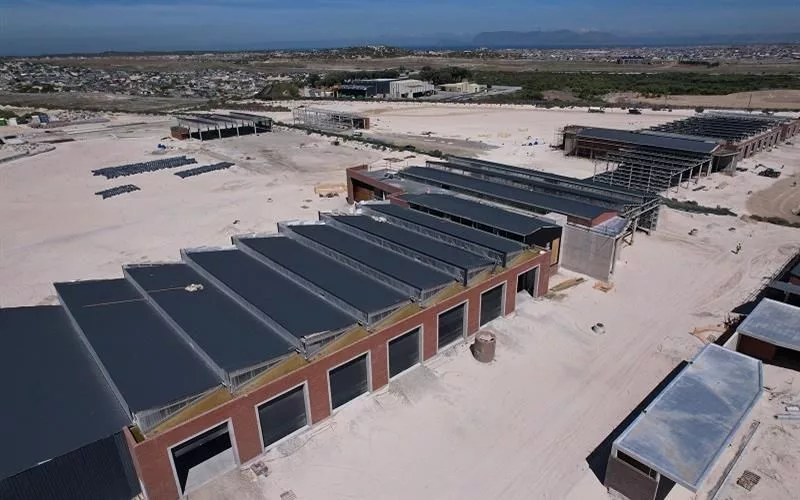Cape Town is building two innovative MyCiTi depots on Spine Road and Mew Way to provide reliable and safe public transport to the city’s low-income households. The project, partially funded by the Dutch government, is expected to be completed in May 2025 and will create temporary job opportunities and fuel local businesses. Despite facing extortion attempts, the project is 65% complete, and the depots will house an initial fleet of 290 buses and serve as multipurpose facilities hosting administrative offices, boardrooms, training spaces, and amenities for staff and drivers.
What is Cape Town’s Strategic Transport Infrastructure Development?
Cape Town’s Strategic Transport Infrastructure Development is a project aimed to provide reliable and direct public transport to the city’s 73% low-income households. The project includes two innovative MyCiTi depots located on Spine Road and Mew Way and is expected to be completed in May 2025. Once functional, the depots will house an initial fleet of 290 buses and are designed to be multipurpose facilities hosting administrative offices, boardrooms, training spaces, and amenities for staff and drivers. The project is partially funded by the Dutch government and is expected to create temporary job opportunities and fuel local businesses.
Landmark in Progress
The mid-March date of 14th, 2024, has become a significant point in time for Cape Town as it celebrates a 65% completion of two innovative MyCiTi depots. The two depots, located on Spine Road and Mew Way, serve as a symbol of advancement within the bustling environment of Cape Town’s most active transport corridors, connecting Khayelitsha and Mitchells Plain.
The inception of this strategic project took place in August 2022, with a projected finish line slated for May 2025. The procedure of its gradual development is taking place on a strategically positioned 15-hectare piece of land owned by the city. Once completed, this site will transform into a bustling hub catering to thousands of commuters seeking dependable, safe, and direct public transport. Notably, the project primarily targets the city’s 73% low-income households as its primary beneficiaries.
Overcoming Challenges
Despite the vision and planning backing the project, it encountered its share of difficulties. Initially, the construction was delayed due to extortion attempts, posing a risk to disrupt the ambitious timeline. However, the resilience of the team shone through. The contractors compensated for the time lost by putting in overtime and working during weekends, demonstrating a commitment to getting the project back on schedule.
Cape Town’s Mayor, Geordin Hill-Lewis, and Councillor Rob Quintas, the Mayoral Committee Member for Urban Mobility, gave their stamp of approval during their recent site visit. Mayor Hill-Lewis highlighted the importance of these new MyCiTi depots, describing them as the nerve center for the extensive extension of the MyCiTi bus system.
Comprehensive Functioning and International Collaborations
The depots, once functional, will house an initial fleet of 290 buses. This number is anticipated to increase as the MyCiTi service extends its reach across the city. These depots are not merely parking spaces for buses. They are designed to be multipurpose facilities hosting administrative offices, boardrooms, training spaces, and amenities for staff and drivers, all within a security-controlled zone.
The project exemplifies the power of international cooperation, with partial funding coming from a Dutch government grant. This partnership has not only eased the construction process but is also expected to create temporary job opportunities, fuel local businesses, and create permanent employment once the services commence. Councillor Quintas expressed his confidence that the large-scale venture would not cause significant traffic disruptions around the construction site.
Current Progress and Anti-Extortion Measures
Progress until February 2024 has been significant. Foundational work and underground bulk civil engineering services, including electricity, water, plumbing, and sewerage services for both depots, have been established. The east depot has also seen the completion of external building work, roof sheeting, and interior finishes. Ongoing work consists of paving the staging area for the east depot and installing a permanent water connection for both depots.
In addition to the construction progress, the city government took a firm stand against extortion attempts that could disrupt construction and service delivery initiatives. Mayor Hill-Lewis launched an Anti-Extortion Campaign with the slogan Enough! Genoeg! Kwanele!, reflecting the city’s unyielding commitment to ensuring a smooth project completion. The city initiated a toll-free hotline that operates around the clock, offering monetary rewards for any information leading to the arrest and prosecution of culprits.
More Than Just Construction
The MyCiTi depots on Spine Road and Mew Way go beyond being just a construction project. They are a testament to a community’s resolve to provide its citizens with safe, reliable public transport. They represent Cape Town’s dedication to progress, perseverance in facing challenges, and a commitment to offering material benefits to its residents. Although the completion date is still a year away, the excitement and anticipation within the community are already evident.
1. What is Cape Town’s Strategic Transport Infrastructure Development?
Cape Town’s Strategic Transport Infrastructure Development is a project aimed at providing reliable and direct public transport to the city’s 73% low-income households. The project includes two innovative MyCiTi depots located on Spine Road and Mew Way and is expected to be completed in May 2025.
2. What are the MyCiTi depots on Spine Road and Mew Way?
The MyCiTi depots on Spine Road and Mew Way are innovative public transport centers designed to accommodate an initial fleet of 290 buses. These depots will provide reliable and safe public transport to the city’s low-income households and will also serve as multipurpose facilities hosting administrative offices, boardrooms, training spaces, and amenities for staff and drivers.
3. When will the MyCiTi depots be completed?
The MyCiTi depots are expected to be completed in May 2025.
4. What challenges has the project faced?
The project faced delays due to extortion attempts, posing a risk to disrupt the ambitious timeline. However, the contractors compensated for the time lost by putting in overtime and working during weekends, demonstrating a commitment to getting the project back on schedule.
5. What is the current progress of the project?
As of February 2024, foundational work and underground bulk civil engineering services, including electricity, water, plumbing, and sewerage services for both depots, have been established. The east depot has also seen the completion of external building work, roof sheeting, and interior finishes.
6. What measures are in place to prevent extortion attempts?
The city launched an Anti-Extortion Campaign with a toll-free hotline that operates around the clock, offering monetary rewards for any information leading to the arrest and prosecution of culprits. This campaign reflects the city’s unyielding commitment to ensuring a smooth project completion.












